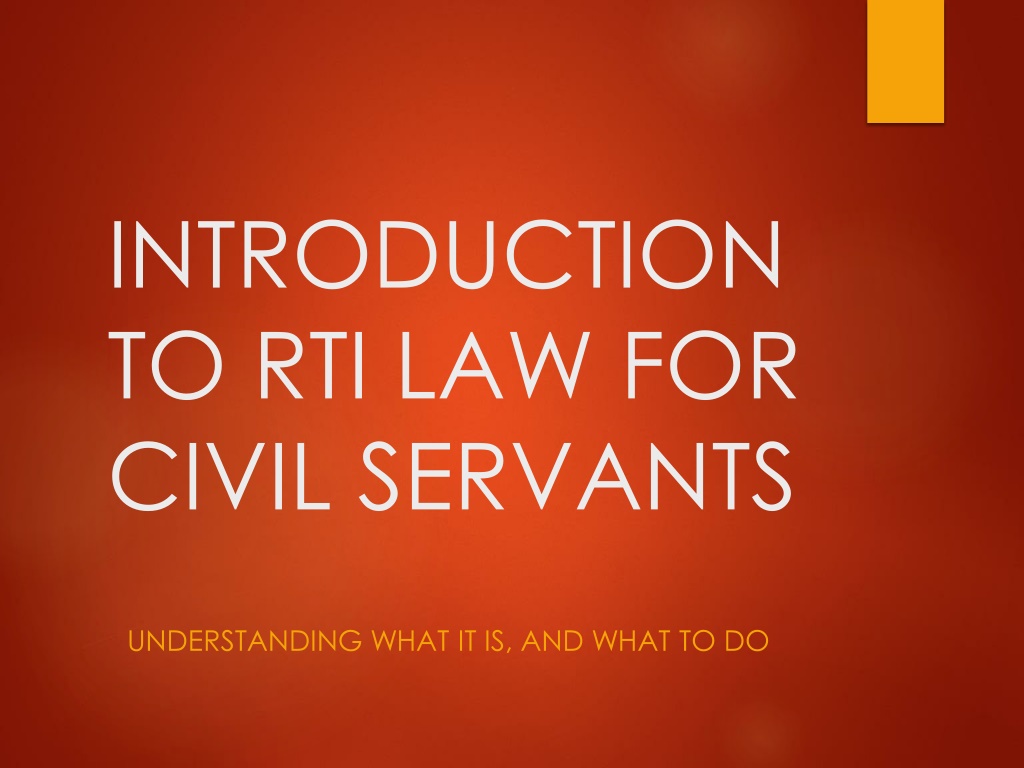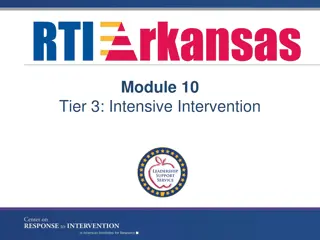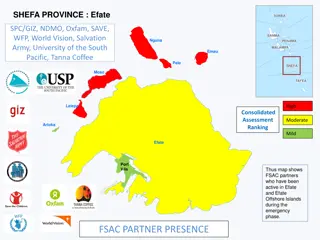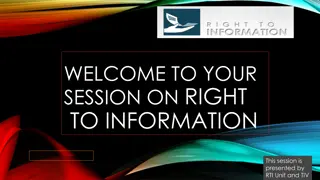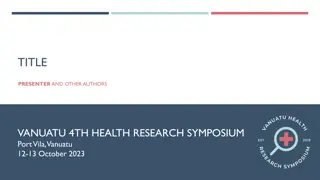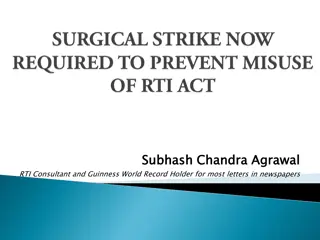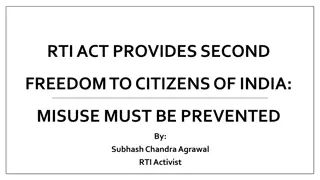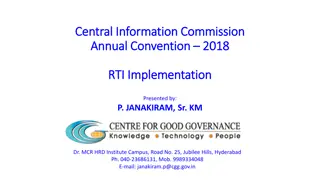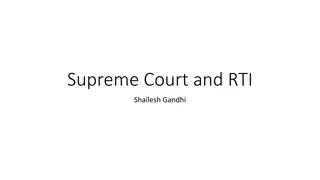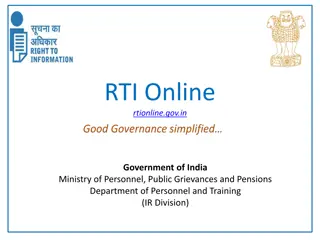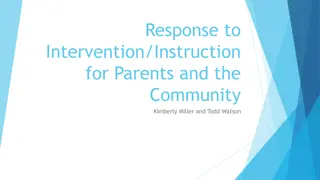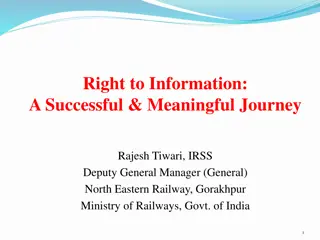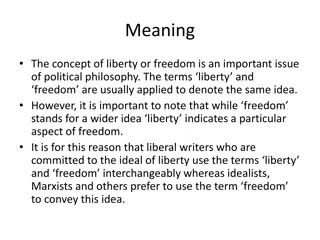Understanding RTI Law and Freedom of Information in Vanuatu
This content provides insights into the importance of RTI law for civil servants, emphasizing transparency and accountability. It covers the objectives of the course, the concept of freedom of information, the necessity of such laws in Vanuatu, and the benefits of openness in governance. The focus is on facilitating understanding among civil servants on responding to information requests and promoting good governance principles through access to information.
Download Presentation

Please find below an Image/Link to download the presentation.
The content on the website is provided AS IS for your information and personal use only. It may not be sold, licensed, or shared on other websites without obtaining consent from the author. Download presentation by click this link. If you encounter any issues during the download, it is possible that the publisher has removed the file from their server.
E N D
Presentation Transcript
INTRODUCTION TO RTI LAW FOR CIVIL SERVANTS UNDERSTANDING WHAT IT IS, AND WHAT TO DO
OBJECTIVES OF COURSE Facilitate understanding of importance of RTI for transparency and accountability and the implications of keeping information unnecessarily secrete 1. Describe main history and main feature of RTI Law and its impact on public authorities 2. 3. Explain how an RTI Officer makes decision on request
OBJECTIVES OF THE COURSE ctd. 4. Ensure that all public authority staff members know how to respond when they receive a request from the public 5. Familiarise public officials with procedures for receiving an information request and how to assist an applicant 6. Provide an overview of additional requirements of RTI law including records management, and publication scheme, and how to help your RTI Officer.
What is freedom of information? Freedom of Indormation is to provide access to information held by Government agencies, relevant private bodies and private bodies, subject to exceptions provided under Part 5 of the RTI Act. Freedom of information also refers to a citizen's right to access information that is held by the state. Freedom of Information speaks for the right of the public to see government information, its agencies and private entities.
WHY Freedom of Information is necessary in Vanuatu The National RTI Policy 2014 and the RTI Act No. 2016 signals the Government of Vanuatu s continuing commitment to the recognition of access to information as a human right, and as a cornerstone of fundamental democratic principles of good governance. Nationally, the Policy represents part of a broader strategy of improved governance under the Comprehensive Reform Programme (CRP), the National Priority Action Agenda and the Leadership Code and the National SDG. Internationally, it honours, to a large extent, a number of conventions to which Vanuatu is a signatory, including the United Nations Convention Against Corruption (UNCAC), which Vanuatu ratified in mid-2011. Regionally, the Policy is in line with Vanuatu s commitments under the 2005 Regional Pacific Plan. The development of this policy is also timely in other respects, coming at a time when there is considerable interest in right to information on the part of civil society and the media, and with global development partners increasingly requiring greater transparency and accountability from aid recipients.
Benefits of Openness Increase public knowledge of the activities and structure of government and encourages participation in national decision-making. Greater public understanding on how government functions and consistent access to government records reduces impropriety and corruption. Records management practices improves
Benefits of openness continues Consistently and proactively releasing information builds trusts, demonstrates commitments to transparency and shows that both government and politicians understand that they are accountable to the public that they serve. Improves the relationship between state and citizens
Benefits of openness ctd Even when information about wrong-doing is released it shows honesty and integrity, deters such action in the future, leads to correction, and often calls for revision of policy and procedures to prevent similar occurrences
RTI Law: What, and Who does it cover? What: Records held in any form Who: Vanuatu s public authority Ministries, portfolios, departments, statutory authorities, government companies, boards and committees Possible extension: private companies and organisations that receives government appropriation and that provide a service important to welfare of Vanuatu society
Implications RTI assumes that information will be disclose in response to a request for unless it falls under an exception or exclusion within the RTI law RTI further requires agencies to proactively publish information and make information more available to the general public.
Implications ctd.. All staff who deal with the public must be aware of the requirements of RTI and must know how to assist people in accessing information Public authorities have to be aware of and able to find information they hold, apply any relevant reproduction fees, and record detail of each request and decisions that have been made.
The changes RTI is expected to bring to Vanuatu Open government requires public authorities to make information available Gazette (publication scheme) Proactive publication of information Inspection in a reading room or library Respond to request for information i) ii) iii) iv) Not all information will be made public. Information maybe withheld if it falls under a specific exemption or exclusion. The public interest test applies in some cases.
What is a RTI request A query seeking information about anything of any age An application to access any records held by a public authority A request for information that would not have been released before the RTI law came into effect
RTI Fundamentals A valid request must: Be in writing (RTI form) and have return address Have a name and address Describe information/records requested i) ii) iii) Applicants are able to inspect, copy or listen to official records held by public authorities You are able to ask for your own personal information that is held by government to be changed if you think it is incorrect
What is an RTI request A query seeking information about anything of any age An application to access any records held by a public authority A request for information that would not have been released before the RTI law came into effect
RTI fundamentals ctd. The RTI law does not require the creation of a document, but it may require a collation of information
RTI fundamentals ctd.. Information from public authorities is free, but reproduction fees may be charged but it cannot exceed the actual cost, and delivery of information (if by mail) A reoriduction cost covers photocopies, CDs, scanning paper records, mailing or sending documents by courier, transcribing audio records etc
Coffee break! Prepare for Session two
RTI Officers RTI Officers are appointed in each public authority to: a) Promote best practice b) Receive request and make decision on each application c) Assist individuals seeking information d) receive complaints e) Ensure full compliance with RTI law
Mandated timely response A decision must be given on a request no later than 30 calendar days after receipt. Public authorities may extend this period once for another 14 calendar days, only in instances of reasonable cause
Third Party notification The Right to Information Officer must take reasonable steps to notify a third party of an application for information if the information contains personal or commercial and confidential material pertaining to the third party, and providing the opportunity for the third party to consent to disclosure or request that the application for access to information be denied within 14 days of being notified. The RTI Act provides for third parties not notified, to consent to disclosure of information or request that the application for access be denied. The Act also requires a Right to Information Officer to make a decision on the grant of access to information and notify the third party of the decision within 21 days of advising the third party of the application for access to information.
Delivering records Within 30 days of receiving a request, the RTI Officer must deliver the records requested If RTI Officer is granting access to third party personal information and the third party did not consent, the RTI Officer must, within 60 days, after the decision is made before releasing the records If an appeal is filed with the Information Commissioner, the RTI Officer must wait for the result
Transfers If a record has to be transferred to another agency, this must be completed as soon as practical but no more than 14 days after receipt The timeline starts over and the receiving public authority has 30 calendar days to respond
Form of access (1) Subject to subsection (4), if an applicant has requested that access to information be provided in a particular form, then access must be given in the form or manner requested. (2) Access to information may be given to an applicant in 1 or more of the following forms or manner: (a) a copy of the information; or (b) an opportunity to inspect the information using equipment normally available to the Government agency, relevant private entity or private entity; or (c) an opportunity to copy the information, using the applicant s own equipment; or
Form of access ctd. (d) in the case of information that is an article or thing from which sounds or visual images are capable of being reproduced, the making of arrangements for the applicant to hear or view those sounds or visual images; or (e) in the case of information which is held on a computer, or in electronic or machine-readable form, and from which the Government agency, relevant private entity or private entity concerned is capable of producing a printed copy of the information or part of it, by supplying such a copy; or (f) in the case of information available or capable of being made available in computer readable form, by supplying a copy in that form; or (g) a transcript of the content of the information, in print, sound or visual form, where such transcript is capable of being produced using equipment normally available to the Government agency, relevant private entity or private entity; or (h) a transcript of the information from shorthand or other codified form; or (i) an inspection of works; or (j) the taking of samples of materials.
Activity 1 Separate into groups of 3 or 4 a)One person will act as the requester b) One person will act as the receptionist or other staff member c) The remaining one or two will act as observers and take (mental) notes Further instruction and a blank application form is available in your information packet
Exemption in the RTI law Personal information Legal privilege Commercial confidential, Public economic interests National security and Law enforcement Health and safety, Heritage sites and the environment Policy making and operations of agencies
On what grounds can a request be refused A public authority does not have to comply with an application at all if: Information requested is under exemption The request is vexatious; The public authority has already complied with the similar request from the same person; The address is not completed
The decision The public authority may: Grand full access Grand partial access Extend the time for response Refuse access to exempt records Refuse to comply with the request Defer the request to another relevant agency Tell the applicant how to access the record outside of RTI procedure Inform the applicant no records exist 1. 2. 3. 4. 5. 6. 7. 8.
Decision ctd The RTI Officer may also transfer the request to another public authority that holds relevant records, who will then make a decision on the application; The RTI Officer must give a reason for their decision and inform the applicant of the right of internal review or appeal to the Information Commissioner
Break! Prepare for Session three
Exemptions Exemptions are specifically listed in the RTI Law. When a document or part of a document is exempt, it will not be released to the public Exemptions apply when the disclosure of the document will prejudice or harm a substantial public interest
Exemptions ctd. Most exemptions are qualified based on expected harm on disclosure Others are absolute and relate to whole categories or types of records regardless of what information they contain or what harm they could cause.
Exemption ctd. The exempt status of a document may change with passage of time or with a change of circumstances The majority of exemptions can only apply for 10 years.
Security, defence or international relations Disclosure would prejudice our security, defence or international relations, or reveal information communicated in confidence from or on behalf of a foreign government or international organisation
Law enforcement Disclosure would or could reasonably be expected to : a) endanger any person s life or safety b) Affect the conduct of an investigation or prosecution or a trial c) Enable a person to find out a source of information
Law enforcement ctd. d) Reveal lawful method or procedures for preventing, detecting, or investigating or dealing with crime (and prejudice the effectiveness of those methods or procedures e) Facilitate someone s escape from lawful detention f) Jeopardise the security of prison
Legal professional privilege When the record is subject to legal professional privilege B) Disclosure would i) constitute an actionable breach of confidence ii) be in contempt of court iii) infringe the privileges of parliament
Cabinet documents The record contains Records of consultations or deliberations arising in the course of cabinet or a committee
Commercially sensitive information a) Disclosure would reveal Trade secrets Information of a commercial value which would be destroyed or diminished if disclosed i) ii) b) Disclosure would prejudice any other commercial interest of any person or organisation (does not apply where the applicant for access is the person or organisation referred to in the records)
PersonalInformation Disclosure would constitute an unreasonable disclosure of personal information or any person whether living or dead
Endangered health and safety Disclosure would endanger physical and mental health of any individual Endanger the safety of any individual
Redacting exempt material Parts of an requested document that contain exempted material can be deleted and the rest of the document released, but the applicant must be informed of where the information is redacted and why.
Public interest test If a record is exempted, but on balance, the factors favouring disclosure outweighs or are equal to those favouring non-disclosure, it may be released if it is in the public s interest.
Public interest test ctd. The RTI officers should explain the adverse consequences of release and how they outweigh potential benefits of release and may need to provide evidence
What is the public interests? Public interest means there is a benefit to the public in certain information being made available. It does not mean of interest to the public but in the interest of the public .
How to we handle an RTI request? Step 1 Direct the applicant to the RTI Officer Step 2 The Right to Information Officer must, within 30 days of receiving the application: (a) determine whether or not to grant the application; and (b) notify the applicant of his or her decision in writing; and (c) if the application is granted, subject to the payment of any fee, give the applicant access to the information.
How to handle an RTI request? ctd. Step 3 If an application relates to information that appears to be necessary to safeguard the life or liberty of a person, the Right to Information Officer must, within 48 hours of receiving the application: (a) determine whether or not to grant the application; and (b) notify the applicant of his or her decision in writing; and (c) if the application is granted - grant the applicant access to the information.
If applicants are unhappy what to they do? They can appeal to the independent Information Commissioner. So, what then does the Commissioner do? Hear, investigate and make a decision on an appeal filed under the RTI Act.
